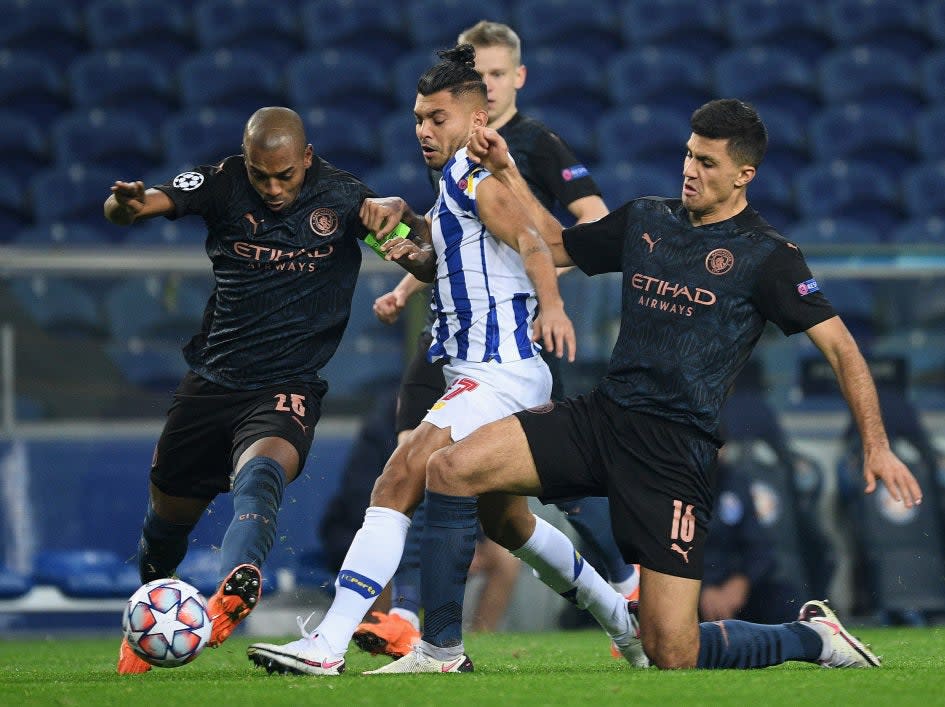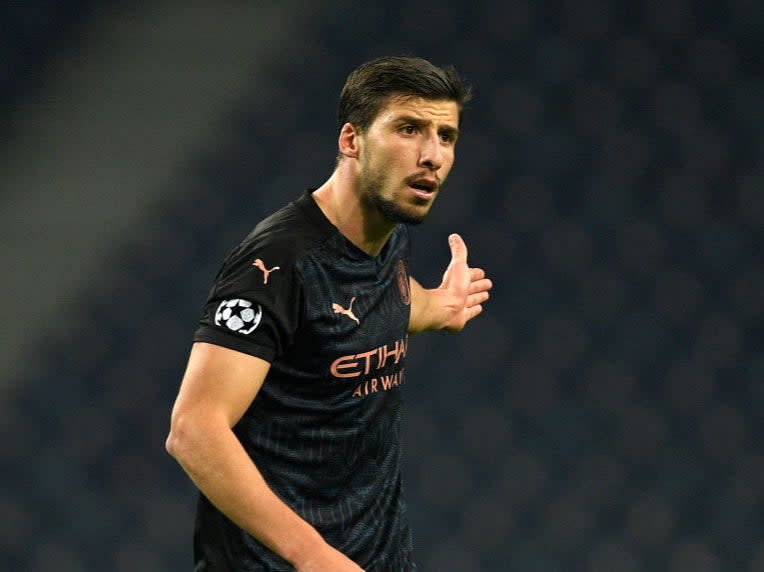How defensively solid Man City are solving some of last season’s problems

Fernandinho and Rodri form a double pivot in front of defence
(Getty Images)As far as first questions go in post-match press conferences, it was slightly leftfield and perhaps that’s what got up Pep Guardiola’s nose.
Manchester City had just played out a largely drab 0-0 draw with Porto. Even so, given that they had seen a goal disallowed, forced a man-of-the-match display out of goalkeeper Agustin Marchesin and had a total of 18 shots on goal, was this really the time to ask whether their set-up with Rodri and Fernandinho as a midfield pivot was too defensive?
Guardiola took a moment to unfurrow his brow and find the right words, then gave a surprisingly long and detailed answer which nevertheless suggested that he disagreed with the very premise.
READ MORE: Man City labour to goalless Champions League draw
“We played incredibly well,” he said. “We attacked. We didn't concede one corner, we didn't concede one shot on target from Porto - one of the best teams in Portugal with the quality and physicality they have and how quick they are up front. We played exceptionally well. Unfortunately we could not score but we came here to finish first. We are happy.

Ruben Dias dished out instructions during City’s draw
Getty Images“We played with huge personality,” he continued, “with courage to go there and keep the ball. I know it is not easy. They played with eight players in the box, they were so strong, the full-backs are so strong but we were patient and we attacked and we created enough chances to win. This is the most important thing.”
That is what you call a fairly comprehensive rebuttal.
Even so, after City’s fourth consecutive Champions League clean sheet and another impressive defensive display, it’s worth asking whether that brave interrogator had a point.
If Guardiola was purposely setting up in a more defensive manner, he wouldn't tell us. The Catalan is nothing if not reluctant to discuss the finer details of his tactical approach with journalists in press conferences, to the point where he will go as far as to deny that tactics have any significant part of play whatsoever.
You may remember how he said that they are “not the most important thing” at this level after the quarter-final defeat to Olympique Lyonnais in Lisbon during the summer. There was a reprise of that in response to that question about selecting both Rodri and Fernandinho. “It doesn't matter, the system or the shape you play these players,” he claimed.
Yet anyone who has read a book, watched a documentary or skimmed through an article about Guardiola in the same way as you’re doing now knows that isn’t what he really thinks. If any manager in world football believes they can bend their players - and as a result, the game - to their will, he does.
And in any case, we know that Guardiola believes tactics have a significant part to play in the success or failure of his teams because he has repeatedly - sometimes frantically and obsessively - changed his set-up over the past year in response to the most challenging time of his spell in Manchester to date.

Fernandinho and Rodri form a double pivot in front of defence
Getty ImagesThe 4-2-3-1 formation which he deployed in Porto on Tuesday night is not particularly new - it has alternated with his tried-and-tested 4-3-3 shape for more than a year now - nor is a conservative pairing at the base of his midfield, even if Ilkay Gundogan is normally preferred to Fernandinho these days.
Yet City’s more methodical, composed and slower approach in possession in the opening months of this season is new and noticeable, and it makes results like Tuesday’s - their first goalless draw in a Champions League group stage game in their history - slightly less surprising.
Watching City, there is not always the same constant movement and fluidity of Guardiola’s attacking players as in seasons past. That cat-and-mouse game of overloading an opponent on one side in order to exploit space on the other is still there but it’s a little less intense and a little more controlled.
As a result, they may be able to cope better with the strains of this season’s condensed schedule and a lot of the problems behind last season’s failed title defence could be solved to boot. Already, the midfield is not broken through with such startling regularity anymore. The opportunities they give up to their opponents are not as clear-cut as they once were.
All this is reflected in their defensive numbers. Aside from that freak 5-2 defeat to Leicester, City have only conceded twice or more in one other game across all competitions this term. Porto are the only side to have scored against City in this season’s competition and yet were limited to just two shots on goal in their own backyard at the Estadio do Dragao.
There is a price to pay for this. While City currently have the Premier League’s third-best defence, they have a run into problems scoring goals. There’s every chance that could change as fixtures swing in their favour - as recently discussed in these pages - but some of that attacking vigour could be lost in the trade-off.
But perhaps Guardiola has made the calculation that if it helps to deliver a first Champions League title in Istanbul in May, it will be worth it. If so, he is unlikely to tell us.
Read More
Guardiola pleased by City’s ‘incredible’ Champions League group stage
VAR rules out Jesus winner but City seal top spot regardless with draw

